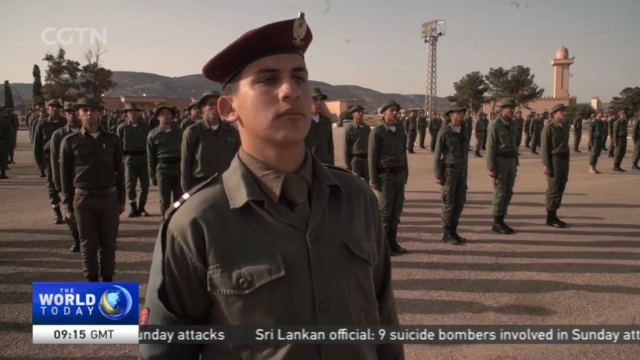
19:13, 24-Apr-2019
Libya Conflict: Egyptian president calls on intl. community to assume responsibility for Tripoli clashes, take diplomatic action
Updated
19:10, 27-Apr-2019
03:16

In Egypt, the president is calling for immediate diplomatic action from the international community to tackle rising tensions in Libya. President Abdel Fattah al-Sisi made the remarks during an emergency meeting of the African Union, called to discuss the ongoing crises in Libya and Sudan.
He says the international community needs to assume responsibility for the surge in violence in Libya, saying the time to end this is now. The UN has warned fighting is likely to continue, as hope for a ceasefire fades. Eastern forces have been on a campaign to take back Tripoli from Libya's internationally-recognized government for more than three weeks. CGTN's Guy Henderson reports from Benghazi.
They are the future officers of Khalifa Haftar's Libyan National Army. One year at this military academy has given these cadets discipline. The next two will teach them to command.
All under the watchful eye of soldiers whose experience dates back long before the revolution. Some say such competence is needed. Others that it undermines the cause.
GUY HENDERSON BENGHAZI "The LNA claim to have as many as 85,000 personnel in their ranks. They see themselves as a professional army, not a militia whose loyalty can be bought."
The figures are disputed but there's little doubt the LNA is growing. Here at least, it's a far cry from the early days. Something General Imraja Alomami freely admits.
IMRAJA ALOMAMI GENERAL, LIBYAN NATIONAL ARMY "The number of LNA fighters was very small when the operation against Islamic State and Al Qaeda started", the General says. "Then our civilian supporters joined us in battle. A large number then went through the academy to be transformed into proper soldiers. Others went back to their civilian jobs."
Most who stayed are in Tripoli now, many former militiamen, veterans of the civil war. Their conduct's hard to verify, journalists on this side of the fight can't access the frontline.
GHASSAN SALAME UN SPECIAL ENVOY TO LIBYA "I call for a peaceful solution", says the UN envoy to Libya. "Whatever the work of the international community, it will need a special Libyan will to stop the war."
A will the UN itself admits is lacking.
MARIA DO VALLE RIBEIRO UN HUMANITARIAN COORDINATOR FOR LIBYA "We are likely to see a continuation of hostilities for some time to come. For that, we need to gear up, and we need to accelerate and increase our capacity to be able to respond."
In the east, they argue they have what it takes to bring stability sooner. By force. Would a victory for Khalifa Haftar's soldiers see them head back to the barracks though? Or would these soldiers become Libya's future ruling class? Guy Henderson, CGTN, eastern Libya.

SITEMAP
Copyright © 2018 CGTN. Beijing ICP prepared NO.16065310-3
Copyright © 2018 CGTN. Beijing ICP prepared NO.16065310-3